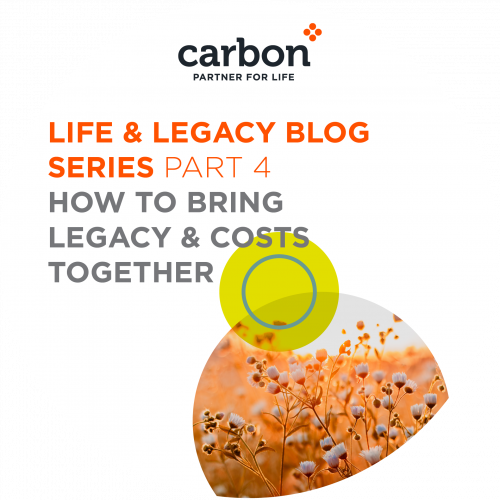News
Life & Legacy Blog - Part 4: How to bring legacy and costs together

In our second blog in this short series we looked at legacy and minimising Inheritance Tax (IHT). Most of our clients are likely to pay some IHT on their eventual death, but there are ways in which IHT can be reduced and which leave more of your wealth for family, friends or causes that are important to you. Most IHT planning is based on giving away money sooner rather than later.
We then noted in our third blog that there are several big unknowns in life – how long we will live for, what our costs might be, and what any healthcare bill will be in particular. Given these unknowns, the natural reaction is to preserve and retain wealth so you can best meet any costs which come along.
The aims of minimising IHT by giving money away, while preserving capital for long life and/or potential healthcare costs, are to some extent at odds with each other. So how do you reconcile the two?
There is no easy answer, but by using a financial model based on your personal situation, you can bring together your assets, income and your potential costs for the rest of your lifetime, building in assumptions for life expectancy and healthcare costs, and trial different scenarios. Ultimately this should allow you to see your situation more clearly and come to a figure that you would be comfortable giving away to reduce your IHT liability while being confident that you would have sufficient to live on in later life.
And then the model should be revisited regularly – is there scope to give away more, or should we stop giving money on a regular basis?
The difference by using a model is the confidence to give away a reasonable amount. Most of us are cautious about giving away money and will err on giving away a small amount, and while financial modelling can allow you to remain cautious, in most cases clients tend to give away a much larger amount than they had in their minds initially, which potentially translates into a lower IHT bill and more money going to the people and causes they care about (now and on death), while leaving funds to meet the client’s costs for rest of their lives.
And don’t forget that almost any planning around your estate and care should prompt you to review your Will, Power of Attorney and pension death benefit nominations.
It’s an important topic for many and, if you want to have a chat see a demonstration of how the modelling can work, please contact your usual Carbon contact, or the authors of this series Iain and Richard.
The value of investments and the income derived from them can fall as well as rise. You may not get back what you invest. This communication is for general information only and is not intended to be individual advice. It represents our understanding of law and HM Revenue & Customs practice. You are recommended to seek competent professional advice before taking any action. Tax and Estate Planning Services are not regulated by the Financial Conduct Authority.

Sign-up for our Carbon Catch-Up Newsletter
Part of The Progeny Group
Progeny is independent financial planning, investment management, tax services, property, HR and legal counsel, all in one place.
Carbon Financial Partners, part of The Progeny Group, is a trading name of Carbon Financial Partners Limited which is authorised and regulated by the Financial Conduct Authority under reference 536900.
Carbon Financial Partners Limited is registered in Scotland. Company registration number SC386400. Registered Address: 61 Manor Place, Edinburgh, EH3 7EG. Carbon Financial Partners Limited is part of The Progeny Group Limited.
© Carbon Financial Partners 2025
www.financial-ombudsman.org.uk
Client Account | Personal Finance Portal | Privacy Notice | Cookies | Careers